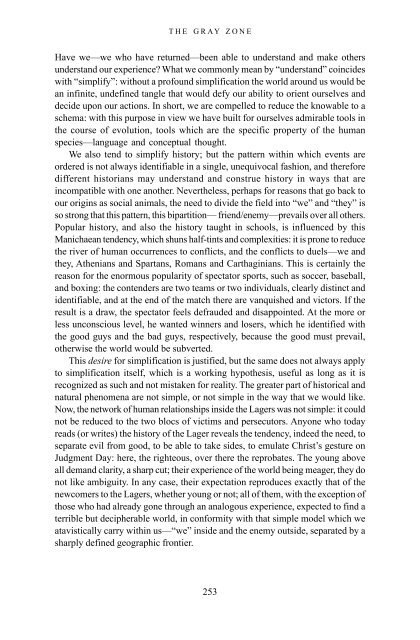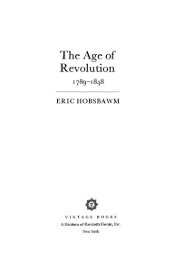The_Holokaust_-_origins,_implementation,_aftermath
The_Holokaust_-_origins,_implementation,_aftermath
The_Holokaust_-_origins,_implementation,_aftermath
Create successful ePaper yourself
Turn your PDF publications into a flip-book with our unique Google optimized e-Paper software.
THE GRAY ZONE<br />
Have we—we who have returned—been able to understand and make others<br />
understand our experience What we commonly mean by “understand” coincides<br />
with “simplify”: without a profound simplification the world around us would be<br />
an infinite, undefined tangle that would defy our ability to orient ourselves and<br />
decide upon our actions. In short, we are compelled to reduce the knowable to a<br />
schema: with this purpose in view we have built for ourselves admirable tools in<br />
the course of evolution, tools which are the specific property of the human<br />
species—language and conceptual thought.<br />
We also tend to simplify history; but the pattern within which events are<br />
ordered is not always identifiable in a single, unequivocal fashion, and therefore<br />
different historians may understand and construe history in ways that are<br />
incompatible with one another. Nevertheless, perhaps for reasons that go back to<br />
our <strong>origins</strong> as social animals, the need to divide the field into “we” and “they” is<br />
so strong that this pattern, this bipartition— friend/enemy—prevails over all others.<br />
Popular history, and also the history taught in schools, is influenced by this<br />
Manichaean tendency, which shuns half-tints and complexities: it is prone to reduce<br />
the river of human occurrences to conflicts, and the conflicts to duels—we and<br />
they, Athenians and Spartans, Romans and Carthaginians. This is certainly the<br />
reason for the enormous popularity of spectator sports, such as soccer, baseball,<br />
and boxing: the contenders are two teams or two individuals, clearly distinct and<br />
identifiable, and at the end of the match there are vanquished and victors. If the<br />
result is a draw, the spectator feels defrauded and disappointed. At the more or<br />
less unconscious level, he wanted winners and losers, which he identified with<br />
the good guys and the bad guys, respectively, because the good must prevail,<br />
otherwise the world would be subverted.<br />
This desire for simplification is justified, but the same does not always apply<br />
to simplification itself, which is a working hypothesis, useful as long as it is<br />
recognized as such and not mistaken for reality. <strong>The</strong> greater part of historical and<br />
natural phenomena are not simple, or not simple in the way that we would like.<br />
Now, the network of human relationships inside the Lagers was not simple: it could<br />
not be reduced to the two blocs of victims and persecutors. Anyone who today<br />
reads (or writes) the history of the Lager reveals the tendency, indeed the need, to<br />
separate evil from good, to be able to take sides, to emulate Christ’s gesture on<br />
Judgment Day: here, the righteous, over there the reprobates. <strong>The</strong> young above<br />
all demand clarity, a sharp cut; their experience of the world being meager, they do<br />
not like ambiguity. In any case, their expectation reproduces exactly that of the<br />
newcomers to the Lagers, whether young or not; all of them, with the exception of<br />
those who had already gone through an analogous experience, expected to find a<br />
terrible but decipherable world, in conformity with that simple model which we<br />
atavistically carry within us—“we” inside and the enemy outside, separated by a<br />
sharply defined geographic frontier.<br />
253



